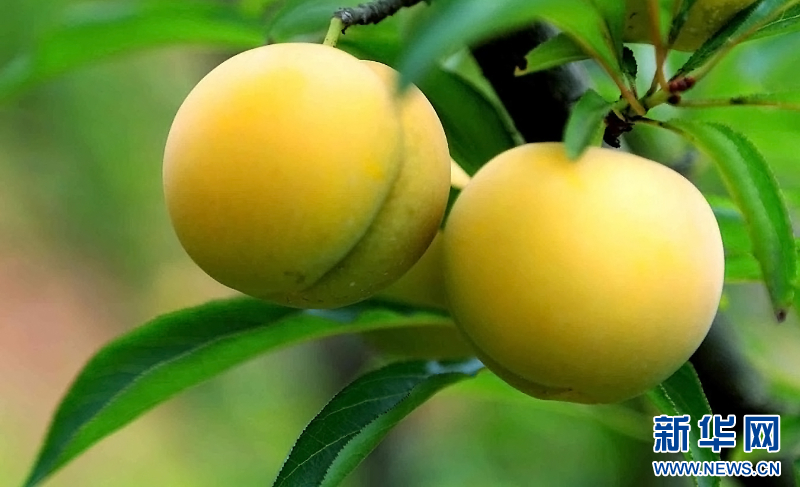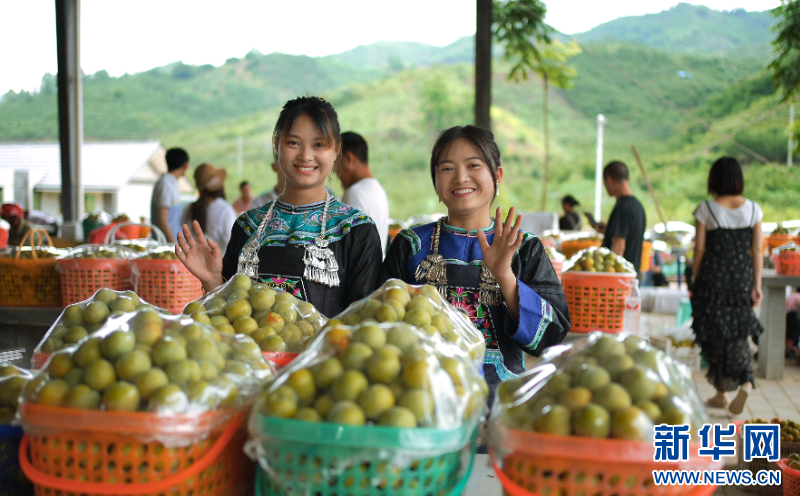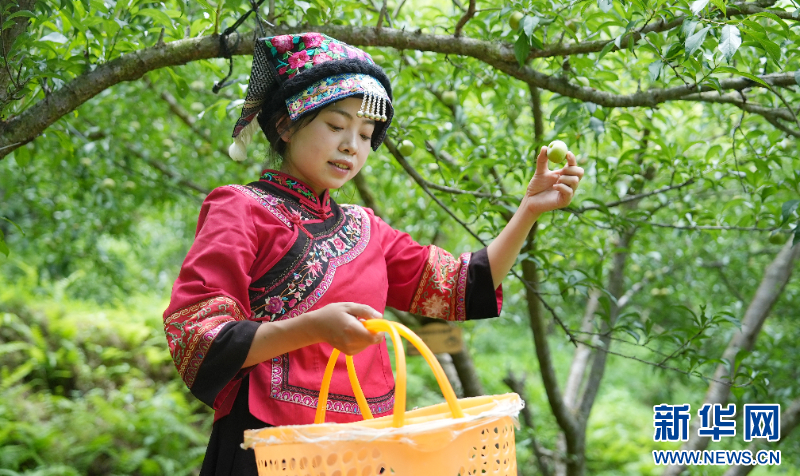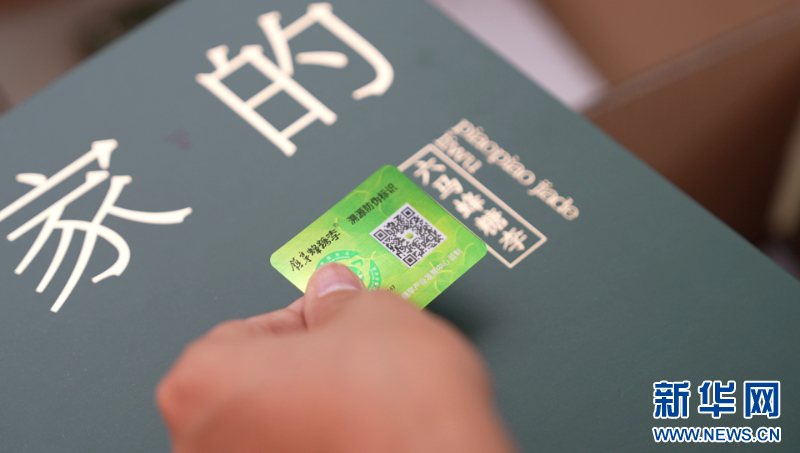
Zhenning honey plums hang from a tree in Zhenning Buyi and Miao Autonomous County, Anshun city, Guizhou province, in southwest China. [Photo by Xinhuanet]
Enjoy blooming flowers in March; savor succulent plums in June. Every year in June and July, the lush plum orchards in Liuma town, Zhenning Buyi and Miao Autonomous County, Anshun city, Guizhou province, in southwest China, begin fruiting. The sight of vibrant green and yellow honey plums dotting the mountains is a testament to the region’s rich agricultural heritage, and the crisp texture and honey-like sweetness of the fruit are a refreshing delight.
Zhenning’s honey plums have surged in popularity across China over the last three years due to their excellent quality and command an average retail price of over RMB100 (US$14.13) per kg – five to six times higher than regular honey plums.

Two local farmers dressed in traditional ethnic attire sell their fruit at the Honey Plum Trading Center in Zhenning’s Liuma Town. [Photo by Xinhuanet]
A sweet storm sweeping the nation
On June 27, 2024, an event known as the Guizhou Zhenning Honey Plum Production and Marketing Matchmaking Conference took place in Guangzhou, the largest city in south China. Nearly 100 merchants eager to forge production and marketing partnerships attended the event, and a flagship Zhenning honey plum store also officially debuted in the metropolis, attracting a bustling crowd.
Li Yamei, deputy director of the product development department at a Guangzhou-based company that engages in the retail of fruit and fruit products among other endeavors, noted that the Zhenning honey plum is considered to have superior flavor and a more aesthetically pleasing appearance than regular varieties of the honey plum. The premium fruit is especially favored in large metropolitan areas like the Greater Bay Area megalopolis, which encompasses Guangzhou and eight other cities in south China as well as the Hong Kong and Macao special administrative regions.
Back in Liuma the atmosphere was equally vibrant. An influx of vehicles and merchants filled the once-quiet streets, transforming honey plums into a hot commodity. Local accommodations quickly filled up as buyers from across the country flocked to secure the first Zhenning honey plums of the season.
Zhong Jian, a fruit merchant from west China’s Chongqing municipality, arrived in late May to negotiate purchases with local growers.
“By mid-June, around six or seven hundred buyers had gathered in Liuma,” he recalled. “If you didn’t book a hotel in advance, you were out of luck.”
Another buyer, Chongqing resident Chen Benhua, expressed confidence in the marketability of the honey plums, sharing, “They sell out by 10 a.m. every day after arriving at the wholesale market early in the morning, having been shipped from Liuma the previous evening.”
Quality control informed by 10 years of cultivation and improvement
Zhenning’s unique climate and geography make it an ideal place to grow high-quality honey plums. The region features a special mild valley microclimate characterized by a long, frost-free period, significant differences in daytime and nighttime temperatures, low levels of rainfall, and ample sunlight with relatively low heat as well as distinct soil composition, both of which enhance the flavor of the fruit.
The dedication of local farmers and agricultural experts has been pivotal in the development of the Zhenning honey plum industry. The region has been improving its honey plum varieties and developing and launching large-scale farming initiatives since the early 2000s.
Zhenning has established six standardized farming demonstration sites and has developed localized honey plum standards covering fertilization, planting, cultivation, green pest and disease prevention and control, harvesting, storage and preservation, grading, processing, and transportation so as to maintain a high level of quality. The county also issues a cultivation calendar in order to provide farmers with standardized scientific guidance covering the timing of various tasks.
“My family’s nearly 100-mu plum orchard requires year-round care even though the sales season is short,” grower Liu Qiliang explained in the summer of 2024. “Strict standards must be followed every step of the way from fertilizing to weeding and pruning to harvesting and sorting. Any amount of negligence will affect yields and quality.
The consistency that has been achieved has contributed to the Zhenning honey plum receiving numerous accolades, including national awards and certifications, solidifying its status as a premier agricultural product. With a cultivation area currently exceeding 14,730 ha, Zhenning has become the leading honey plum-producing county in China. In 2023, 59,700 metric tons of the fruit were produced in the administrative area, for over RMB3 billion (US$424.04 million) of total output value.
A key production hub, Liuma was included in the national list of towns with rural characteristic industries surpassing RMB1 billion (US$141.3 million) in output value in both 2021 and 2022 and is the only town in Guizhou to join the “1 Billion Yuan Club” through the success of a single agricultural industry.

Liuma farmer Liu Wenpiao picks honey plums during a live commerce stream. [Photo by Lu Zhijia / Xinhuanet]
Broadening market reach and increasing popularity
The local government has partnered with various enterprises in order to enhance the Zhenning honey plum brand and broaden its market reach so as to make the most of the success that the fruit has been having. The rise in brand recognition that has been occurring has led to a growing community of fans of the fruit.
“Many of my colleagues asked me when honey plums would be available half a month ago,” mentioned local resident Wang Lin, who helped friends, family, and associates across China purchase dozens of kilograms of the fruit, at the start of summer 2024.
Zhenning honey plums’ online presence has also surged as e-commerce platforms have been used for regular e-commerce as well as live commerce. Liu Qiliang’s daughter, Liu Wenpiao, launched shops on various ecommerce platforms after she graduated from university. She successfully sold 1,500 kg of fruit and generated approximately RMB150,000 (US$21,195) in revenue in the first half of 2024 and continues to be engaged in the industry.
Major logistics companies establish special operations in Liuma during peak Zhenning honey plum season, which enables customers in 265 cities to receive their deliveries promptly – usually the next day. In 2023, approximately 1,864 metric tons’ worth of Zhenning honey plums were sold online for a total of more than RMB150 million (US$21.2 million), with sales having doubled annually over the last three years.

A Zhenning honey plum grower receives an origin traceability code issued by the county government. [Photo by Lu Zhijia / Xinhuanet]
Addressing the challenges of acclaim
Popularity often comes with challenges, however. Counterfeit Zhenning honey plums have emerged, complicating the market and causing concern among local farmers about the potential impact on their reputation.
In response, Zhenning has launched initiatives designed to eliminate counterfeiting, including the creation of a special task force focused on conducting market oversight and enforcing compliance. The local government has also been taking measures to standardize packaging and has been implementing a traceability system so as to ensure that consumers receive authentic products.